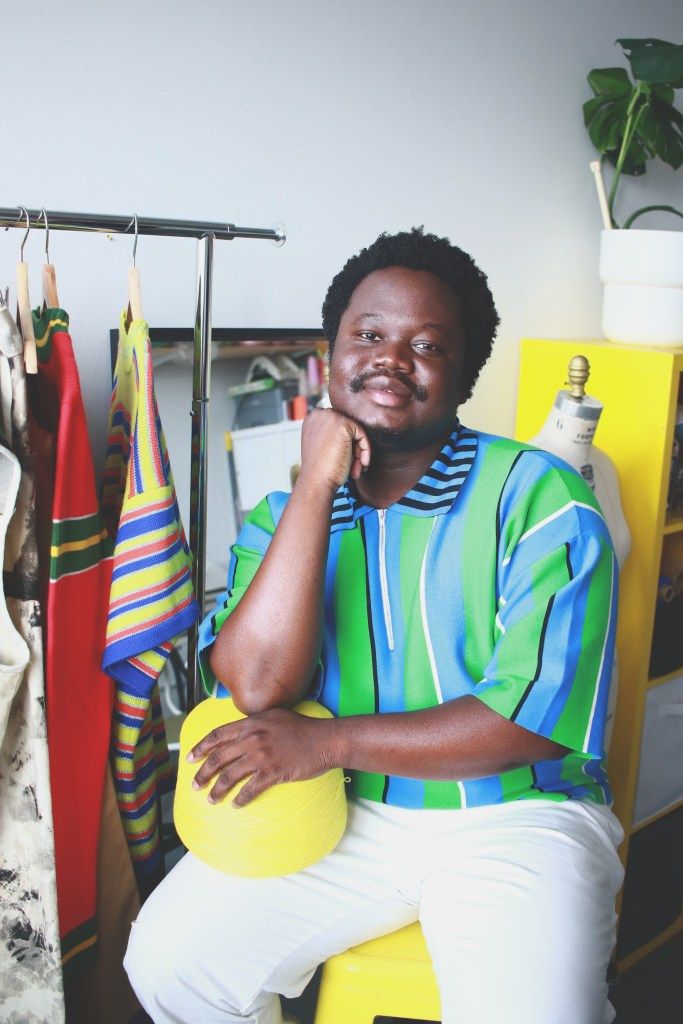Creative Jacques Agbobly is a work in progress.
The New York City-based designer recently moved into a new larger studio in Dumbo. It marks a new chapter for the nascent brand, which Jacques — who uses they/them pronouns — relaunched earlier this year, rebranding from Black Boy Knits to their family name: Agbobly.
“I’ve always included notions of family into my work,” they explained.
Their understanding of craft and handmade creation — concepts deeply embedded in Agbobly’s work — began at home, with their Togolese family. “I really wanted to put my family name up front, because I wouldn’t be here without them. I want people to understand that there is a familial connection to clothing.”

The newest collection of Black Boy Knits by Jacques Agbobly.
Courtesy of Black Boy Knits
Agbobly is thoughtfully working on their next collection: a fall offering, aiming to debut at the start of 2024, potentially at New York Fashion Week. “We’ve been shopping around and trying to find sponsors,” they said, with a goal to show presentation style.
Many young designers debate if showing at fashion week makes sense, due to the massive expense and manpower needed — but Agbobly counters that for their work, a look book isn’t enough to showcase the breadth of ideas. “It’s important for you to witness the work; people have to see it in person,” Agbobly said.
The collection will be an expansion of their unisex, inclusive line, introducing new silhouettes and — in a first for the creative — being made with an eye toward wholesale, a big next step for a designer who once made everything to order. “I did a lot of knitting,” they said earnestly, with a laugh. Now Agbobly has a team of five, and is slowly expanding and mapping out what the brand stands for and where it is headed.
Agbobly launched the brand out of necessity in 2020, calling it Black Boy Knits, with a range of colorful knits and beaded separates the designer made in their apartment.

A past collection of Black Boy Knits by Jacques Agbobly.
Courtesy of Black Boy Knits
“I didn’t start this with any business knowledge at all. It was just purely creativity and necessity,” they said. Since then, the designer has been a quick study — winning accolades along the way.
The latest is the inaugural WWD Honor for One to Watch, recognizing a designer who is destined to become a force in fashion in the years ahead.
Black Boy knits also won the 2022 DHL Logistics in Fashion Award, awarded by the shipping and logistics company and the Council of Fashion Designers of America, which helps fashion businesses capitalize on opportunities to expand worldwide. They were a finalist of the 2022 CFDA/Vogue Fashion Fund, which linked them with a dedicated mentor. Agbobly was assigned to Thom Browne. This year, they won the Inclusivity Award at the inaugural Fashion Trust U.S. awards.
“It’s all put me in front of a lot of people and there’s been a lot of eyes on the brand, which has been really great,” they said.
Browne in particular is a designer Agbobly has looked up to, and they’ve learned a lot as his mentee. “He’s someone who has created a world for himself, it’s more than the clothing. People are really looking to be part of his vision as a whole. That’s something that I really look up to as a designer, to kind of create a holistic vision,” they said.
Browne gave sage advice on designers advocating for themselves, Agbobly noted. “He told me, ‘you have to really believe in your ideas and really fight for it. You must think that what you’re doing is the best thing in the world. You’re the only person that can do it. Otherwise, it’s not worth it.’”

The newest collection of Black Boy Knits by Jacques Agbobly.
Courtesy of Black Boy Knits
Still very much self-funded, Agbobly’s collection will introduce his house codes and fit, a focus on their customer and their needs. “I’m thinking about, how do we invite the client to become part of that story,” they explained.
“We’re in this era in fashion where we’re just consuming so much, we forget that clothes are made by people, real people, and those people have lives and feelings,” they said of the ephemeral nature of their work. “For me, it’s always there’s always going to be an aspect of my work that is handmade.”
The refocused brand identity includes more denim, tailored items, gowns and shirting, pieces that can be put into production for stores, but with Agbobly’s personal touches.
“For the first time I find myself having to advocate for my design,” they said, putting Thom Browne’s advice into action with a factory that recently pushed back over a complicated pant design. Agbobly says it’s all been part of their learning process — albeit with a growing pains — but one the designer is enjoying.

A past collection of Black Boy Knits by Jacques Agbobly.
Courtesy of Black Boy Knits
Queer, Black, nonbinary, born in Togo, immigrating to Chicago, and then moving to New York, Agbobly has identities that intersect, a point they explore with their work. “I want my brand to kind of serve as a permission to for other people like me to not be afraid to live in between the lines,” they said.
Having eyes on the brand and gaining recognition has opened the door to new collaborators, too, particularly on social media, which they say has been place to connect with like-minded creatives from around the world, including some from their native Togo. “It’s been a tool to grow on our community. To see the expansion of your vision. That’s a great tool,” they said.
Agbobly sees their work work as a bridge between West Africa and rest of the world. “I think that my purpose as a designer, as a creative person, is to kind of like platform everything that’s going on in West Africa,” they said.
While the brand is New York-based, Agbobly’s linage is centered. They would like to eventually involve the artisans in Togo and West Africa in the production of their collections, a way to help the community and fund initiatives and education, connecting their heritage to the west, while giving back to where they come from.
Upon entering Agbobly’s new sunlit studio, two floor-to-ceiling shelves are packed with books and fabric swatches, casting light into their creative process.
“I’m an avid collector of art books and I watch a lot African films,” they said of other ways they help ignite their inspiration flame. But the true gem? A special yellow box, full of family photos from their childhood, a clue to the special sauce that’s imbedded into their work.
“For me, the creative process never changed. It just evolved,” they said. “I know that money is a big thing, but for me at the core of it, I’ve always been doing what I’m doing, but now with just a little bit more resources and a team to help support it.”

